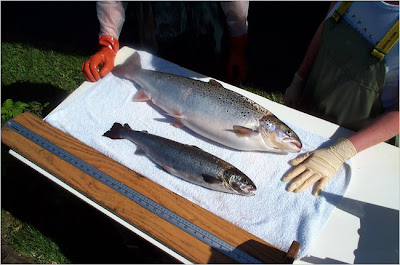 (Photo: AquaBounty
(Photo: AquaBountyCan you guess which one is "gene-engineered"? The one up top.
Both fish are the same age.)
The developer of the salmon has been trying to get approval for a decade. But the company now seems to have submitted most or all of the data the F.D.A. needs to analyze whether the salmon are safe to eat, nutritionally equivalent to other salmon and safe for the environment, according to government and biotechnology industry officials. A public meeting to discuss the salmon may be held as early as this fall.
Some consumer and environmental groups are likely to raise objections to approval. Even within the F.D.A., there has been a debate about whether the salmon should be labeled as genetically engineered (genetically engineered crops are not labeled).
The salmon’s approval would help open a path for companies and academic scientists developing other genetically engineered animals, like cattle resistant to mad cow disease or pigs that could supply healthier bacon. Next in line behind the salmon for possible approval would probably be the “enviropig,” developed at a Canadian university, which has less phosphorus pollution in its manure.
The salmon was developed by a company called AquaBounty Technologies and would be raised in fish farms. It is an Atlantic salmon that contains a growth hormone gene from a Chinook salmon as well as a genetic on-switch from the ocean pout, a distant relative of the salmon.How consumers will react is not entirely clear. Some public opinion surveys have shown that Americans are more wary about genetically engineered animals than about the genetically engineered crops now used in a huge number of foods. But other polls suggest that many Americans would accept the animals if they offered environmental or nutritional benefits.
“Our fish is identical in every measurable way to the traditional food Atlantic salmon,” Mr. Stotish said. “If there’s no material difference, then it would be misleading to require labeling.”
Virtually all Atlantic salmon now comes from fish farms, not the wild.

No comments:
Post a Comment